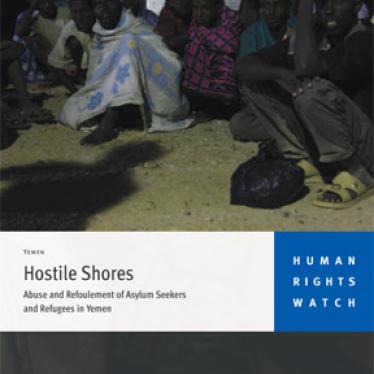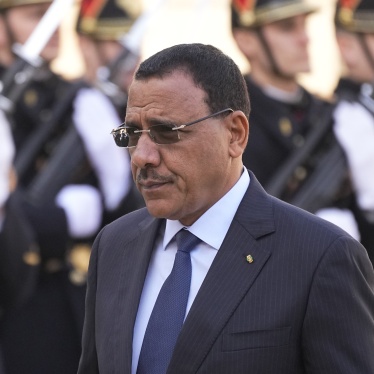The news that Umar Farouk Abdulmutallab allegedly trained to blow up a US airliner at al Qaeda camps in Yemen has drawn sudden attention to a country that is not well known in Washington. The prospect of deeper US involvement in an Arab nation already warring with domestic rebel groups should raise a number of red flags.
The Yemeni government has a lot on its hands. For more than five years, it has been battling Huthi rebels in the mountainous north of the country, with successive ceasefires punctuated by new rounds of fighting. The United Nations estimates that more than 175,000 people have been displaced by the conflict, with reports of extreme scarcity of water and malnutrition.
Human Rights Watch researchers in northern Yemen in October 2009 gathered eyewitness testimony of aerial bombing and artillery shelling by the Yemeni armed forces that resulted in high civilian casualties. Both government and rebels have also been using children under 18 in combat.
This is an ugly war. And it is far from the Yemeni government's only challenge. North and South Yemen united as one country in May 1990, but fought a brief civil war in 1994 in which the north prevailed. Southern Yemenis contend that the central authorities then dismissed many southerners from the army and government jobs, and denied southern Yemen its fair share of national resources.
Since 2007, a growing wave of protests has rocked the south, with the loosely-knit Southern Movement now demanding secession. Human Rights Watch researchers documented six occasions during 2008 and 2009 in which security forces opened fire on unarmed protesters, often without warning and aiming at them from short range. At least 11 people were killed and dozens were wounded. Since July, there have been more reports of protesters bringing weapons to demonstrations.
Yemen is in a tough neighborhood. Refugees fleeing violence in both Somalia and Ethiopia are arriving in large numbers; more than 100,000 people reached Yemen's coast by boat during the past two years. The country is running out of oil---its main source of revenue and water. At least two-thirds of its population is under 25, with widespread unemployment, and government corruption is rampant.
President Ali Abdullah Saleh, a former military officer, has run Yemen for three decades in an authoritarian manner, yet his grip is tenuous in many remote and rugged parts of the country, where tribes run their own affairs. These are the areas where members of al Qaeda in Yemen reside.
The United States is not the only outside actor contemplating intervention in Yemen. Since early November, Saudi warplanes have bombed Yemeni villages in areas controlled by Huthi rebels. The Saudi deputy defense minister, Prince Khalid bin Sultan, said on November 10 that Saudi forces were seeking to establish a 10-kilometer corridor inside Yemeni territory free of Huthi rebels.
On November 16, Huthi rebels posted videos on the Internet showing the bodies of children who they said died in a Saudi bombing raid on a Yemeni village. This information could not be independently confirmed---not much from those mountainous areas can be independently confirmed---but even so, it's a development that should give the United States pause.
Under pressure from Washington -- and with US assistance -- President Saleh on December 17 and 24 launched missile strikes aimed at al Qaeda in Yemen. Human rights groups in Yemen have claimed the attacks killed dozens of women and children, in addition to al Qaeda members. Without better intelligence, it's nearly impossible to know whether these civilian deaths were avoidable.
Civilian casualties are always a human tragedy. But they also undermine the US objective of reducing support for al Qaeda. It took six long years for the US military to come to that important conclusion in Afghanistan. "
"We must avoid the trap of winning tactical victories - but suffering strategic defeats - by causing civilian casualties or excessive damage and thus alienating the people," Gen. Stanley McChrystal wrote in the US military's new tactical directive. As they contemplate deeper engagement in Yemen, US policymakers must keep those hard-learned maxims in mind.
---
Carroll Bogert is Human Rights Watch's Associate Director.








